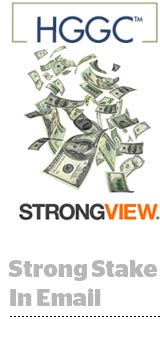 Once again, a private equity firm has bought a majority stake in a marketing tech company.
Once again, a private equity firm has bought a majority stake in a marketing tech company.
Email marketing solutions provider StrongView will get a strategic growth investment from private equity firm HGGC. The deal is expected to close in 30 days, and financial terms weren’t announced. Read the release.
HGGC has a solid background in marketing tech investment. It’s known for grooming ecommerce platform hybris for its $1 billion sale to SAP and, in July, it invested an undisclosed amount into European marketing automation company Selligent.
And like Selligent, StrongView will use HGGC’s funds to speed product growth. It also intends to expand its European presence by increasing its team of about 20 regional staffers. While Selligent is almost exclusively positioned in Europe, StrongView CEO Bill Wagner sees no conflict.
“It’s very complementary,” he said. “They operate in the mid-market, we operate at the enterprise level. They’re more campaign management, whereas we’re more email and cross-channel.”
As with other tech companies in HGGC’s portfolio, Wagner will look for areas to cross-pollinate.
“HGGC has a really interesting portfolio of companies that can help us on a number of different fronts,” he said. “Some as simple as providing account access to the types of customers its other portfolio companies have, like MyWebGrocer.”
From a product standpoint, Wagner said the company hopes to help marketers “focus less on a campaign-based approach and react more to circumstances that consumers find themselves in.”
For instance, when someone opens an email message, StrongView hopes to allow marketers to dynamically change the email content based on the reader’s circumstances.
These aspirations, coupled with StrongView’s current product offering, made it one of Forrester Research’s category leaders in a report last year.
And HGGC’s investment should help StrongView address Forrester’s caveat: that its “comparatively small size will preclude it from global or franchise deals. It has a limited international footprint and no distributed user module.”
Certainly next to the other email marketing leaders Forrester pinpointed – Salesforce, Oracle’s Responsys and Epsilon – StrongView looks like a scrappy up-and-comer.
AdExchanger Daily
Get our editors’ roundup delivered to your inbox every weekday.
Daily Roundup
But it really isn’t, originating as email infratructure company StrongMail way back in 2002. At the time, there were numerous pure-play email marketing companies but as consumers embraced digital, many rebranded as cross- or multichannel marketing solutions providers and got acquired.
In 2012, Teradata bought German email marketing company eCircle. One year later, Salesforce bought ExactTarget, Adobe bought French marketing automation company Neolane and Oracle bought Responsys. And, last year, IBM bought Silverpop.
Notably, StrongView isn’t going to another vendor where, presumably, it would be integrated into a marketing cloud. At least not yet.
“We see those [acquired vendors] being digested into larger companies, and we’re seeing some of their clients being dissatisfied with where they’re taking their products and the level of service they’re getting,” Wagner said.
While StrongView will continuously upgrade its product offering, Wagner isn’t going to expand at the same rate as the big marketing cloud providers.
“We’ll draw a boundary around things that are very useful to marketers, and are natural extensions to what we’re doing,” he said. “For the bigger cloud providers, it’s about maximizing the things they can put on the table that brands can buy.”
These days, private equity buyouts seem to be a popular option for tech companies that want cash without having to tumble through the volatile public markets. In other recent PE deals, Rockbridge Growth Equity bought Triad Retail Media, Vista Equity Partners nabbed Mediaocean, Cathay Capital picked up Smart AdServer for $42.1 million and Vector Capital bought Triton Digital.
Private equity firms that invest in vendors who’ve been around for a while get access to the growing marketing tech space – at a reasonable price.
StrongView, which Wagner said is profitable, had raised a total of $38.1 million from investors like Sequoia and Globespan. Its last Series D round, way back in 2009, came in at $7.6 million, according to CrunchBase. Those investors will no longer be involved with StrongView, and will be selling their stakes to HGGC.












